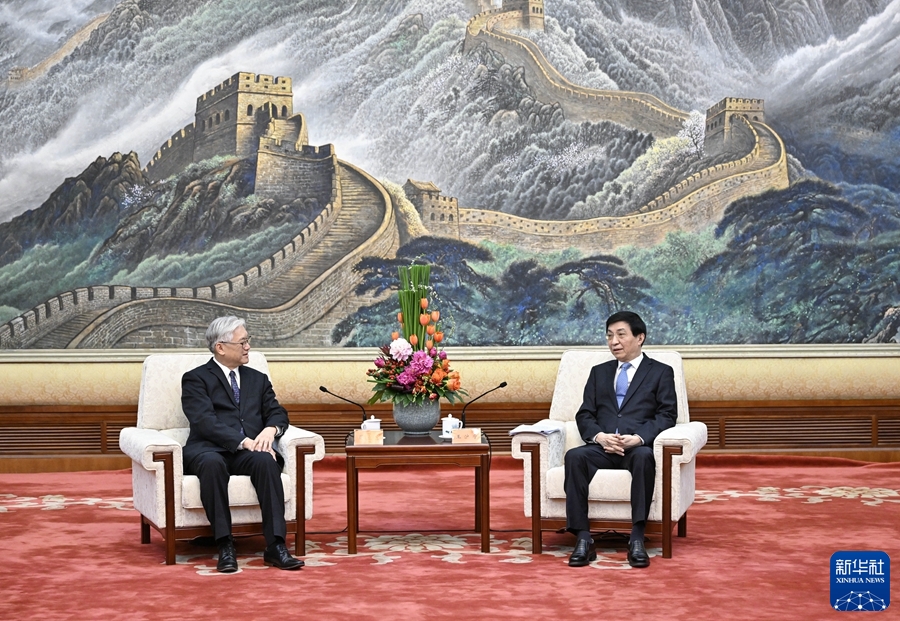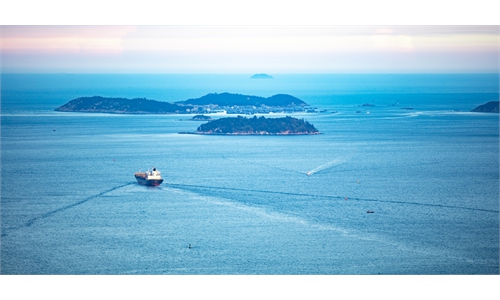Senior CPC official meets visiting KMT vice chairperson, stresses 1992 Consensus and countering ‘Taiwan independence’

Wang Huning (right), a member of the Standing Committee of the Political Bureau of the CPC Central Committee, meets with Andrew Hsia, vice chairman of the Chinese Kuomintang (KMT) party, in Beijing on February 10. Photo: Xinhua
Wang Huning, a member of the Standing Committee of the Political Bureau of the Communist Party of China (CPC) Central Committee, on Friday met with Andrew Hsia, vice chairman of the Chinese Kuomintang (KMT) party, in Beijing. Both sides expressed willingness to promote exchanges and cooperation across the Taiwan Straits, as well as adhering to the 1992 Consensus, which embodies the one-China principle, and opposing "Taiwan independence."
The meeting, which came after Hsia's meeting with Song Tao, head of both the Taiwan Work Office of the Communist Party of China (CPC) Central Committee and the Taiwan Affairs Office of the State Council, shows that the mainland attaches great importance to the KMT visit, and may let more Taiwan people feel the benefits of the 1992 Consensus more directly.
During the meeting, Wang vowed full efforts to implement the guiding principles of the 20th CPC National Congress and the CPC's overall policy framework for resolving the Taiwan question in the new era. He pledged to put into action the important instructions from Xi Jinping, general secretary of the CPC Central Committee, on promoting peaceful development of cross-Straits relations and facilitating exchanges and cooperation.
Noting that the compatriots on both sides of the Taiwan Straits have a strong desire for normal exchanges, Wang said priority should be given to resume normal cross-Straits exchanges at an early date.
"We welcome and support more Taiwan compatriots to participate in the cause of Chinese modernization and national rejuvenation, to share the fruits of development on the mainland and the glory of national rejuvenation," Wang said.
He stressed that the two parties should further consolidate their common political foundations - upholding the 1992 Consensus and opposing "Taiwan independence," deepen political mutual trust, maintain positive interactions, firmly oppose separatist activities aimed at "Taiwan independence" and external interference in Taiwan affairs, and jointly safeguard peace and stability across the Straits.
Hsia expressed his hope that, on the basis of upholding the 1992 Consensus and opposing "Taiwan independence," the two parties would enhance mutual trust and communication, strengthen exchanges and cooperation, work together for the well-being of people on both sides of the Taiwan Straits, and safeguard peace and stability across the Straits.
Wang Jianmin, a senior expert in cross-Straits affairs at Minnan Normal University in Fujian Province, told the Global Times on Friday that Wang's meeting with Hsia shows that the Chinese mainland and CPC leaders attach great importance to the KMT delegation's visit.
Before the KMT delegation departed, the meeting with Wang Huning had not been on the KMT's confirmed itinerary that was made public, but neither had they denied the meeting would take place. Cross-Straits observers believe that the most important basis for the meeting was the KMT's clear statement of its political stance of opposing "Taiwan independence."
Only the KMT is capable of promoting cross-Straits exchanges and cooperation, as the secessionist Democratic Progressive Party (DPP) authorities are firmly opposed to the 1992 Consensus, resulting in the halting of communication channels, Wang Jianmin said.
Hsia, the former head of Taiwan island's "mainland affairs council," said before his mainland tour that the trip is focused on the interests of Taiwan compatriots, given the current difficulties in cross-Straits exchanges and the problems that Taiwan businessmen, farmers and fishermen have encountered in exporting agricultural products to the mainland.
Hsia certainly did not want to go back empty-handed. If the concerns of cross-Straits trade and business from the island can be properly addressed, it will be of great significance for the KMT in gaining public support on the island, Wang Jianmin said.
The visit to the mainland will also make some skeptics of the 1992 Consensus, both within the KMT and on the island, realize its importance and the significance of cross-Straits relations, the expert noted.
The KMT should realize that upholding the 1992 Consensus is their most powerful weapon against the DPP and they should never throw that away, he said. The central government is very likely to release positive messages this year, gradually opening and resuming imports of agricultural products from the Taiwan region.
"Cross-Straits exchanges and economic and trade interactions are expected to be hot this year," said Wang Jianmin, "Taiwan people will see the benefits more directly: with the 1992 Consensus, there will be peace and development."


